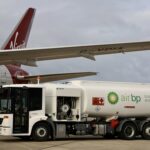 In a strategic move that could redefine the aviation industry’s environmental footprint, the European Union is spearheading a campaign for a ground-breaking international tax on jet fuel. This initiative, aimed at financing critical climate action, comes at a pivotal moment as the world prepares for the upcoming UN’s COP28 climate summit in Dubai.
In a strategic move that could redefine the aviation industry’s environmental footprint, the European Union is spearheading a campaign for a ground-breaking international tax on jet fuel. This initiative, aimed at financing critical climate action, comes at a pivotal moment as the world prepares for the upcoming UN’s COP28 climate summit in Dubai.
At the heart of this effort is the EU’s bid to dismantle the long-standing tax-exempt status of kerosene. This move, championed by the EU’s climate commissioner, Wopke Hoekstra, is not merely symbolic. It signals a significant shift in how governments worldwide are now aggressively targeting polluting industries to meet urgent climate goals.
Despite contributing a seemingly modest 2% to total CO2 emissions, aviation has seen its emissions footprint expand rapidly in recent decades. The urgency of this issue was underscored in 2022, as aviation emissions soared to nearly 800 metric tonnes of CO2, a rebound propelled by the resurgence of international travel post-pandemic.
Jared Ailstock, the managing partner of AIP Capital, a global asset management and aviation investment firm, underscores the timely nature of this initiative. He notes that the international tax intersects with the current jet fuel crisis heading into 2024, potentially setting the stage for transformative changes within the sector.
Since June this year, jet fuel prices have spiked by 25%, exerting unprecedented pressure on airlines. These carriers, already grappling with post-pandemic recovery challenges, have passed on these costs to consumers, with European airfares witnessing a staggering 20-30% hike between the summers of 2022 and 2023. This financial strain is compounded by supply bottlenecks that hamper the production of new, essential aircraft, leading to what could be the most severe engine crisis in airline operations history.
Ailstock points to a silver lining amidst these challenges: the potential acceleration of the sustainable aviation fuels (SAF) market. In a landmark event, Virgin Atlantic recently completed the first transatlantic flight powered entirely by SAF, a biofuel derived from waste oils and animal fats. This flight, emitting 70% less CO2 than flights using traditional jet fuel, marks a significant milestone in sustainable aviation.
However, scaling up the SAF market is fraught with hurdles. A KPMG study highlights the “real availability and scalability challenges” facing biofuels, including supply chain bottlenecks and sustainability concerns regarding feedstocks. This is particularly relevant in the UK, where, despite governmental ambitions, no dedicated SAF plants are operational.
Therefore, The EU’s proposed jet fuel tax carries a dual purpose. It is not just a tool for raising funds for climate action but also a catalyst for advancing the development of sustainable fuel sources. This innovative approach promises to reshape the aviation industry, steering it towards a more sustainable and resilient future.
Ailstock is poised to offer insights into the key challenges confronting the aviation industry in 2024, which include the implications of the fuel crisis, the rising cost of labour, supply chain disruptions, and the diversification strategies that airlines must adopt to bolster profitability.
The world watches with bated breath as the EU’s lobbying efforts gain momentum. The decision to tax jet fuel could be a defining moment in our collective journey towards a more sustainable future, making the upcoming COP28 climate summit a focal point for global environmental policy.
Written by: Charmaine Lu



















